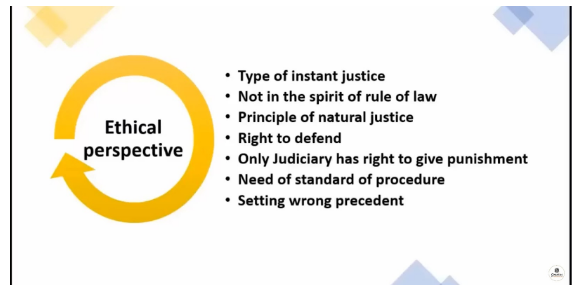Context:
Following the recent violence in Nuh, Haryana, the local authorities with state support, demolished several residences of the accused rioters in neighborhoods.
More about the news:
- This type of action, referred to as “bulldozer justice,” has become commonplace over the past year.
- It has been witnessed in various places, such as Khargone in Madhya Pradesh, Khambhat in Gujarat, Jahangirpuri in Delhi, and Nagaon in Assam, where home demolitions are utilized as a response to political violence.
What is Bulldozer Justice?
- The concept of bulldozer justice represents a kind of group penalty, where punishment is inflicted before guilt is determined and even extends to innocent family members of the accused.
Safeguards to Prevent Demolition:
- Survey before Demolition: The courts have mandated that the administration must undertake a survey before carrying out demolitions beyond enforcing basic procedural protocols like giving sufficient notice.
- Rehabilitation: Survey aims to determine if the residents are eligible for rehabilitation programs. Which is not merely about relocating people from one part of town to another. Rather, it entails guaranteeing that their already precarious lives are not significantly disrupted.
Concerns with Bulldozer Justice:
- Injustice to Marginalised Sections: Unauthorised structures often serve as homes for economically marginalized and vulnerable individuals, for whom the state has failed in its duty to provide adequate housing.
- Non adherence to standard procedures: The immediate demolitions do not adhere to the required procedures or essential standards before demolition.
- State approved punishment: Instead of maintaining the framework of law enforcement and justice, which defines law-abiding states, the government opts for a form of informal justice dependent on force, thus violating the very principles of the law it should uphold.
- Violation of principle of law: These patterns underscore the adoption of a punitive approach by the state, abandoning established legal procedures and replacing them with a system that employs force, thereby positioning the state itself as a transgressor of the law.
- Beginning of Authoritarian Society: Abandoning the rule of law in favor of informal justice signifies the first step towards an authoritarian society, where the the basic rights and freedoms of individuals will be at the mercy of unpredictable state authorities.

Response of Judiciary:
- Silence upon the issue: The responsibility to uphold the rule of law and the Constitution rests with the courts but the courts too have remained silent over the issue.
- Acceptance of state’s rationale: Even the Supreme Court of India, when confronted with this issue, seems to have accepted the state’s rationale of targeting unauthorized structures.
Way Forward:
- No moral justification to Bulldozer Justice: Meting out punishment without established guilt and giving the state the authority to determine penalties erodes the fundamental principle of the rule of law.
- Upholding Rule of Law: The rule of law acts as a safeguard between an excessively controlling state and the essential security of individuals.
- Directives from Judiciary: The recent directive from the High Court of Punjab and Haryana signifies the first instance where the judiciary has taken active notice of this trend of unlawful bulldozer “justice”.
- Right to Natural Justice: One can only hope that this marks the beginning of the judiciary’s efforts to uphold fundamental constitutional principles and values in the face of state impunity.
News Source: The Hindu
![]() 11 Aug 2023
11 Aug 2023

